From the castles of Copenhagen to the windswept coastline of Jutland, there’s so much to see in Denmark. Here’s our guide to the most notable landmarks in Denmark to help you plan your next trip.
Denmark blends old-world charm with modern design, offering a mix of history and innovation just a short flight, drive, or ferry ride from Norway.
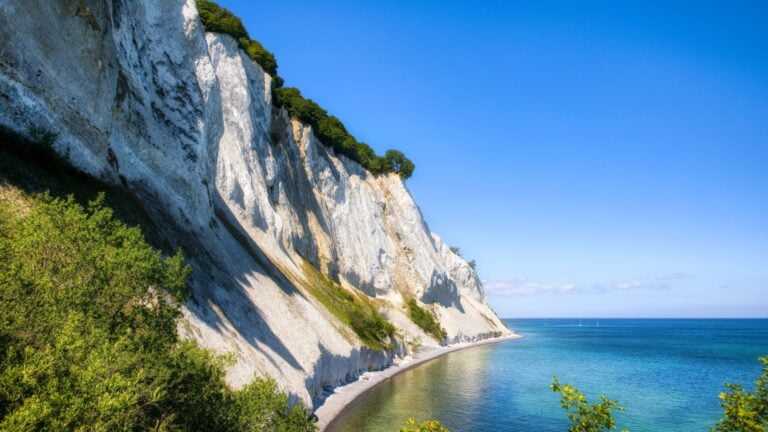
This Scandinavian country is known for its flat yet beautiful landscape and a sustainable lifestyle. From the lively streets of Copenhagen to the scenic coasts of Jutland, Denmark has something for everyone.
Renowned as the home of ‘hygge’ and happiness, the city beckons travelers keen to unravel the essence of Scandinavian contentment.
Among the famous landmarks, visitors can explore everything from ancient Viking sites to cutting-edge design museums. Here are the most notable landmarks in Denmark, starting with Copenhagen.
Copenhagen Landmarks: Must-Sees in the Capital
The capital city dazzles with landmarks ranging from Nyhavn's vibrant canal-front houses to the famed Little Mermaid statue by the sea. Whatever your interests, Copenhagen offers a curious range of landmarks to visit on your trip.
The Little Mermaid
The Little Mermaid sculpture, a small bronze figure based on Hans Christian Andersen’s tale, has been a Copenhagen landmark for over a century.
Despite its size and the crowds it draws, it remains a must-see in the eyes of many tourists. It’s often best viewed as part of a city tour by boat or bike.
Its significance and status as a landmark is underscored by its role in various political protests. From pro-vegan campaigns to a human rights group protesting the Qatar World Cup, the mermaid seems to lure protestors as well as tourists.
Tivoli Gardens
Established in 1843, Tivoli stands as Copenhagen's most celebrated outdoor space and one of the world's oldest amusement parks, even inspiring Walt Disney.
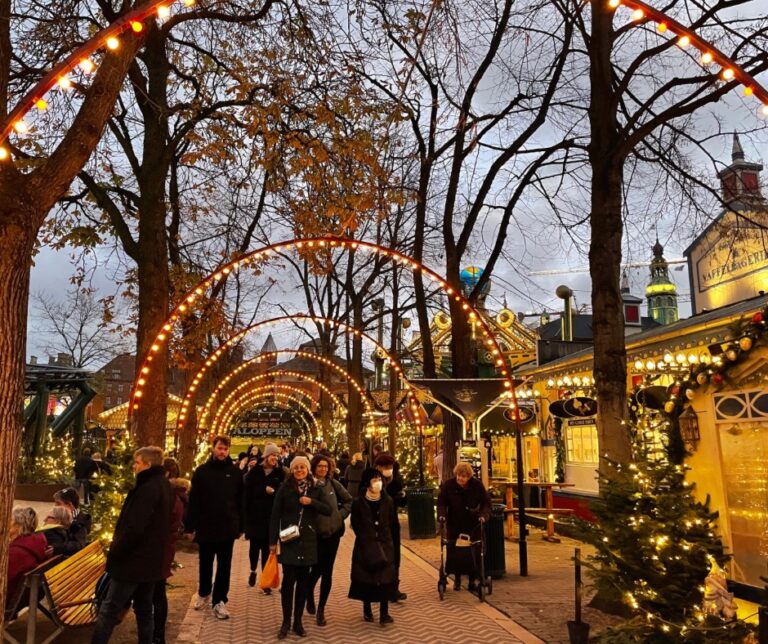
It's particularly appealing to families, offering a variety of attractions including the Chinese-style Pantomime Theatre. The park shines during its Christmas season, showcasing a beautifully lit festive atmosphere.
Rosenborg Palace
This Dutch Renaissance castle now housing Denmark’s crown jewels and Royal Collections offers a glimpse into the country’s regal history amidst stunning gardens.
You don’t have to tour Rosenborg Palace to get a sense of its stature. Even a simple stroll through the surrounding parkland provides a sense of its architectural beauty.
Round Tower
Dating back to 1642 when it was built for astronomical research, the Round Tower today offers panoramic views of Copenhagen. It also houses a former library where Hans Christian Andersen frequented, now hosting events and workshops. The climb to the observatory is a highlight, well worth the entrance fee.
Nyhavn
This picturesque canal lined by brightly-coloured townhouses is quintessential Copenhagen.
Originally a commercial port where ships from all over the world would dock, it has transformed into a vibrant waterfront teeming with people enjoying the relaxed atmosphere.
The historic buildings, some dating back to the 17th century, now house a variety of cafes, restaurants, and bars, making it a popular spot for both locals and tourists.
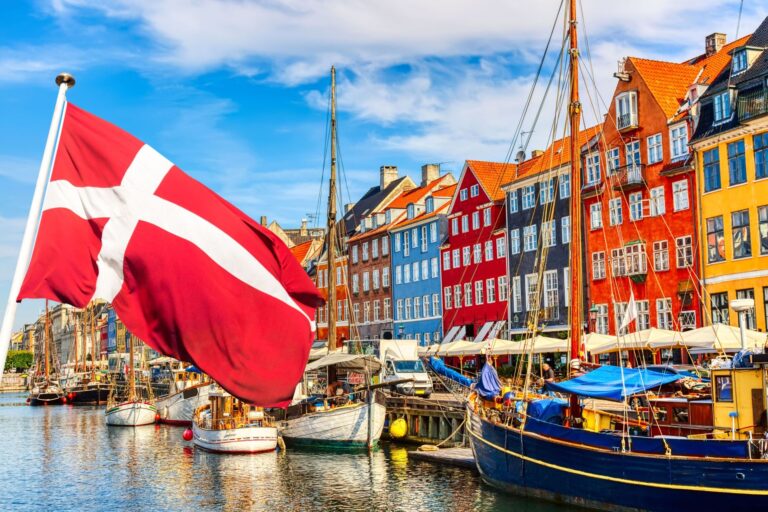
This area serves as a perfect backdrop for leisurely strolls, boat tours, and photographers keen to capture the essence of Copenhagen’s maritime heritage.
Christiansborg Palace
A key site for Danish political drama enthusiasts, Christiansborg Palace embodies executive, legislative, and judicial powers, showcasing Danish architectural evolution post-fire.
Highlights of a visit to the palace include the Great Hall and palace chapel, with the Royal stables nearby featuring the Golden State Coach.
Amalienborg
Amalienborg, the winter residence of the Danish queen and home to the Crown Prince couple, welcomes visitors to explore its museum and witness the changing of the guard. It offers insights into royal life, including an extensive collection of smoking pipes.
History lovers can save money by buying a combination ticket for some Copenhagen attractions. A combination ticket is available for Amalienborg and Rosenborg Palace.
Frederiksberg Palace
Frederiksberg Palace, set atop a hill within exquisite gardens, is known for its baroque architecture and the Chinese Pavilion, a notable example of 18th-century Chinese-inspired design.
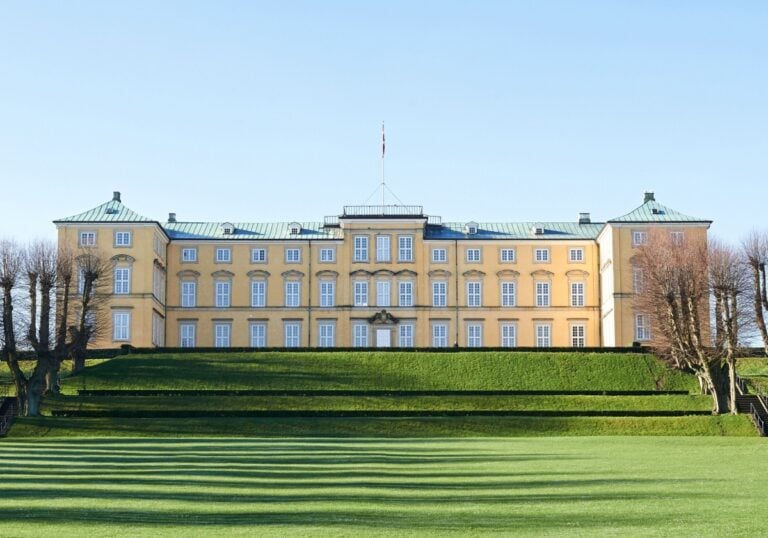
Though housing the Royal Danish Military Academy, its grounds and nearby zoo offer leisurely exploration, especially by boat in summer.
Other Landmarks in Denmark
Beyond the vibrant streets of Copenhagen, Denmark is dotted with remarkable landmarks that capture the essence of its rich history, stunning landscapes, and architectural marvels. Here are a few notable landmarks outside the capital.
The Cliffs of Møn (Møns Klint)
These striking white chalk cliffs offer breathtaking views of the Baltic Sea. Located on the island of Møn, the cliffs are surrounded by lush forests and provide a habitat for a variety of rare plants and animals. The area also features a visitor center and museum detailing the geological history and natural heritage of the site.
Aarhus' Old Town (Den Gamle By)
Located in Denmark's second-largest city, Aarhus, this open-air museum offers a fascinating glimpse into Danish urban life through the ages. It’s a must see for anyone interested in Scandinavian history.
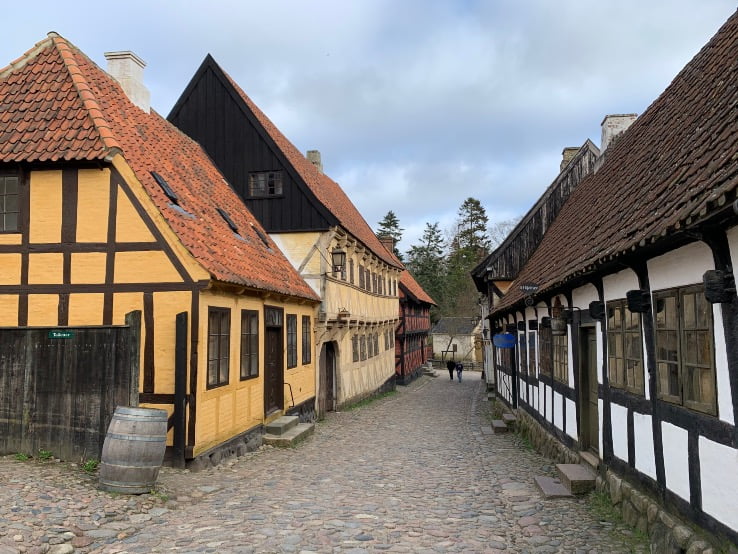
Den Gamle By features over 75 historical buildings collected and relocated here from all around the country, dating from the 16th century to the 1970s. You can go inside many of the buildings, and also visit some curious museums with diverse exhibitions ranging from old toys to the history of Aarhus.
The Original Legoland
The first Legoland park, located in Billund, remains a family favourite, offering a world of imagination and creativity made from millions of LEGO bricks. It features miniature models of famous landmarks, thrilling rides, and interactive workshops.
Kronborg Castle
Situated in Helsingør, this UNESCO World Heritage site is one of Northern Europe's most significant Renaissance castles.
It is famously known as the setting of Shakespeare's “Hamlet” and offers tours that delve into Danish royal history, Renaissance architecture, and the castle's strategic military importance.
Jelling Rune Stones
These fascinating rune stones are located in the town of Jelling and are often referred to as Denmark's “birth certificate,” marking the transition of the Danes to Christianity in the 10th century.
The larger of the two stones was erected by King Harald Bluetooth in memory of his parents and to celebrate his conquest of Denmark and Norway.
Grenen Sandbar, Skagen
Known for its distinctive light and landscapes that have inspired many artists, the Grenen sandbar at Denmark’s northernmost point is where the Baltic and North Seas meet.
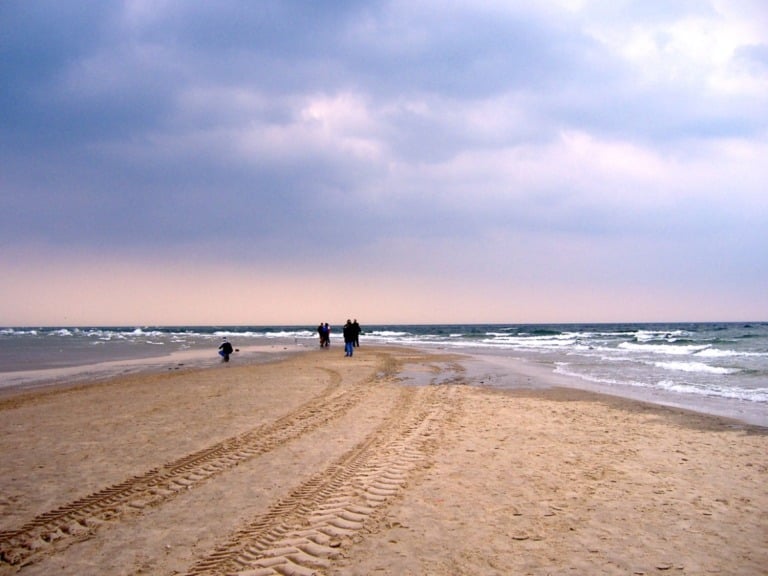
Nearby Skagen is the northernmost town of Denmark. Among the points of interest here is the Skagen Museum, which showcases works by the Skagen Painters.
Viking Ships of Roskilde
Just a short trip from Copenhagen, the Viking Ship Museum in Roskilde presents a captivating insight into Denmark's seafaring ancestors, the Vikings.
The museum is home to five original Viking ships excavated from the Roskilde fjord, offering a unique glimpse into Viking shipbuilding and maritime life over a thousand years ago.
Beyond the historic ships, the museum offers interactive exhibits, workshops where visitors can watch traditional shipbuilding techniques, and even the chance to sail in a Viking ship replica at certian times.
Have you spent any time in Denmark? What are your favourite landmarks in Copenhagen, and elsewhere in the country? Let us know your thoughts in the comments.

